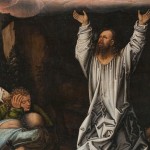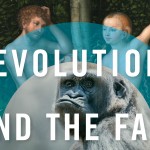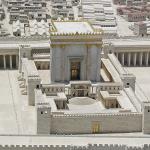
NEWSFLASH: The Giordano Bruno portion of “Cosmos: A Space-Time Odyssey” (click link to watch the full first episode) looks like it was researched on 4Chan.
The notion that Bruno was a martyr for science or that he was an inventive dreamer ultimately useful to science is false. The show wants to enlist him for science while denying he was a scientist, although the way it presents his story makes Bruno look like a science martyr. I can’t figure out what this muddled thinking is aiming at by wasting half of a decent show on a cartoon history.
The graphic below from the blog Quodlibeta is a quick rundown of the real history behind Bruno’s execution.
It’s complicated:
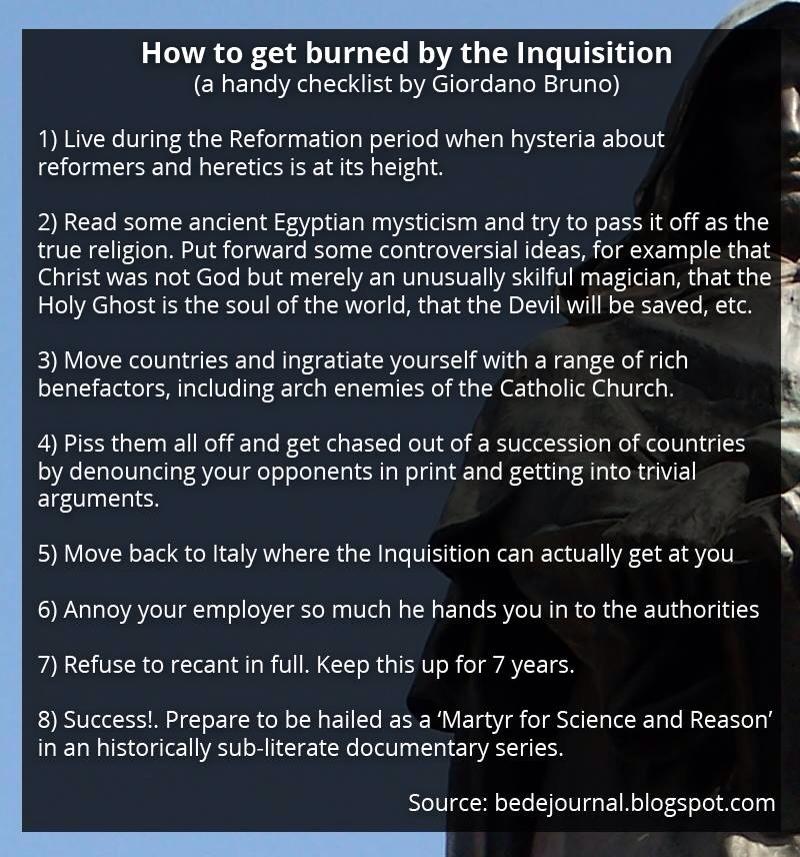
I know it’s a little immature to conduct an argument with cartoons and memes, but Neil deGrasse Tyson already blazed that trail for me in Cosmos, therefore I’ll continue in this vein.
But let me get this out there before I go on being all negative and stuff:
The FOX series (nota bene: FOX outfits are known for their objectivity) is visually a little like Tree of Life but without the philosophical and emotional depth, also a little like The Matrix but without the action and suspense. All in all, I enjoyed being led through the Cosmos with decent computer generated graphics despite the kitschy and condescending spaceship. I’d even consider showing it to my Pre-K kids, although I worry they’d only remember the spaceship.
I enjoyed the show mostly when it didn’t stray into areas where scientists have classically shown little competence. I’m thinking of minor swaths of the human condition when compared with the hugeness of science. I’m thinking of fields as insignificant as history, ethics, sociology, metaphysics, politics, and religion (“Your god is too small”). Science is way bigger than all those, and as with Giordano Bruno’s Hermetic god: SIZE DOES MATTER.
For example, two clear and present dangers of our age were caused by scientists being way bigger than ethics: environmental degradation and nukes. Is it any wonder that since scientists contributed so much to creating both of these problems they now have so much trouble getting people to listen to their warnings about nuclear wars and environmental destruction?
Can we trust them? From experience we can trust them to scapegoat the uncomprehending herd that hasn’t been intiated into the arcana of science for using their well-intentioned gifts to humanity, such as nukes, badly. You’ll have to look hard for signs of repentance for working for the military-industrial complex. Pangs of conscience usually come too late, like with Oppenheimer (or Nobel and his dynamite awards)–if at all.
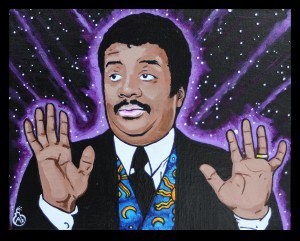
In fact, I would have liked it a lot more if the show was a little bit more skeptical about science. Instead it gave us the following tired cliche: science is based upon a “simple method” that builds upon the accumulated knowledge of previous generations. To the theology buffs among you this should have sounded somewhat like how religious traditions function, for example, in the development of doctrine. And of course Thomas Kuhn caught plenty of flack for comparing the structures of scientific research to the structures of religious organizations when his now classic The Structure of Scientific Revolutions first came out. Kuhn also gave a thick account of the messiness of scientific revolutions in that book. He aired all their human pettiness and resentments, instead of making scientists out to be superheroes or martyrs. Bruno Latour continues this tradition of science writing today. The messy human side of science is on display in books such as Laboratory Life and Pandora’s Box.
It ain’t all progress, baby. There is also plenty of miscalculation, mystification, regress (and flat out failure) in science (yes, I said science). Ain’t nothing wrong with that. Maybe even scientists are sinners?

But with finals week right around the corner there’s one thing that I find especially disturbing about the Cosmos series: it appears to be engaging in plagiarism.
Here’s the story of how I came to that conclusion. I didn’t run across that neat graphic I gave you up there on the facts of Giordano Bruno’s life immediately. And so after watching the show I grabbed my copy of the ultimate science and religion BS radar: Galileo Goes to Jail and Other Myths about Religion and Science (published by Harvard University Press not Bob Jones University). The chapter debunking Bruno as a science martyr contains the following quote from Andrew Dickson White as an example of appalling ideology-driven 19th century “historical” scholarship:
“But the new truth could not be concealed; it could neither be laughed down nor frowned down. Many minds had received it, but within the hearing of the papacy only one tongue appears to have dared to utter it clearly. This new warrior was that strange mortal, Giordano Bruno. He was hunted from land to land, until at last he turned on his pursuers with fearful invectives. For this he was entrapped at Venice, imprisoned during six years in the dungeons of the Inquisition at Rome, then burned alive, and his ashes scattered to the winds. Still, the truth lived on.”
If you’ve watched the show, does this sound familiar?
From what I remember this is the basic outline of the 20 minute segment on Bruno (that was such an immense waste of time). What’s worse, I suspect that whole sections of the Bruno “history” monologue are lifted whole cloth out of that Dickson White passage. I can’t wait to read the script when it’s made public.
It wouldn’t surprise me much if my hunches are correct. I’ve graded too many essays and exams written by science majors for humanities classes. The results aren’t encouraging. They think that if they are competent in one area of knowledge then that will transfer to another area of knowledge. But they forget that knowledge does not work like hermetic magic.
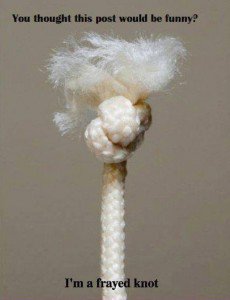
Before I forget there’s also one more error: the idea of the infinite universe was not invented by Giordano Bruno. It is not even a modern idea. It came into being during the horrible Middle Ages. It was popularized by Cardinal Nicholas of Cusa in the early fifteenth century–meaning, about a 150 years before Giordano Bruno. As luck would have it there’s a great new book about Nicholas of Cusa entitled The Analogical Turn. I’m afraid the teaching assistants who wrote the script for the first episode of Cosmos probably didn’t read it and they probably knew nothing about the Karsten Harries classic Infinity and Perspective, which has Cardinal Cusa as the hero in the middle of the development of the idea of a center-less and infinite universe.
In closing I should add that Galileo Goes to Jail and Other Myths About Religion and Science should be required reading for those of you who insist watching the rest of Cosmos.
You could even design a whole drinking game around watching the show. Drink a shot of vodka every time Neil deGrasse Tyson falls for one of the 25 (soo many opportunities) common myths debunked in the book. I suspect you also pick up the wonder-inducing and gravity-defying habit of alcoholism while you’re at it. And that’s one heck of a sacrifice for Lent.
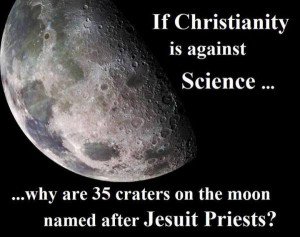
Speaking of Lent: Is anyone else bored by the nauseatingly frequently repeated truism that we are made out of stardust? What’s so wonder-inducing about being made from the contents of the cosmic ashtray? Such an ordinary fact doesn’t make me wonder or help me overcome alienation, it makes me want to buy a duster!
Let’s not forget that interstellar ashtray was generous enough to accommodate both Carl’s Sagan’s joints and Carl Sagan himself.
How cold is that?
For a more balanced take on the dialogue between science and religion–one that doesn’t deify stardust–consult this list.






